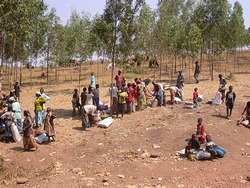KINSHASA, 6 March 2007 (IRIN) - About 43,400 Congolese expelled from diamond mines in northern Angola are living in precarious conditions near the Congolese border, humanitarian officials said. 
Photo: Olu Sarr/IRIN 
Internally displaced people receiving help from the Catholic charity, Caritas. Thousands of people have been expelled from Angola but have no means of survival in the DRC
Angolan authorities began expelling the Congolese in 2006, accusing them of being illegal diamond miners.
"It is hard for these people to return to their homes since they came from far away and they have no means of getting there," Guy-Marin Kamandji, the officer in charge of communication for the Catholic charity, Caritas, said on Tuesday in Kinshasa, capital of the Democratic Republic of Congo (DRC).
"Some of the expelled women and children are victims of gang-rape by soldiers of the Angolan army," Kamandji said. "They arrived in their tens of thousands, crossing the border on foot, without any belongings, barefoot and often in very poor health."
Jean-Tobbie Okala, the spokesman for the United Nations Mission in the DRC, MONUC, said 70 percent of those expelled were men, while the rest were women and children.
The latest wave of those expelled arrived in the DRC in January.
According to MONUC, the largest group of those expelled - estimated to be 37,600 people - returned to the DRC through the province of Bandundu, which shares the longest border with Angola. Another 5,800 returned from Angola through other Congolese provinces.
Caritas, which has a presence in Bandundu, said no aid had been organised for these expelled Congolese, most of whom are living with foster families, placing a heavy burden on these poor households.
The Minister for Internal Affairs, Denis Kalume, said his Angolan counterpart had informed him of the expulsions. He confirmed that those expelled were illegal immigrants.
"We were informed but we are not prepared to take care of all these people," he said. "The Angolan government should have given us more time to get prepared."
He said officials from both governments would meet to resolve the issue.
However, Kamandji said those expelled were without means. "Most of them have lost all their property and resources," he said. "Plundered in Angola, some of them lost their hard-earned wealth after having worked for more than a decade in these areas."
A meeting of MONUC, UN agencies and non-governmental organisations was scheduled for Tuesday to prepare a team to assess the humanitarian needs of those expelled.
Previous expulsions of Congolese from Angolan mines have been accompanied by accusations of rape, beating, looting and other human rights violations.
ei/re/js/mw
Related articles
- • Thousands of Women March Against M23 Rebels in Kinshasa (November 24, 2012)
- • Tshisekedi Says He Won, Can He Prove It? (December 17, 2011)
- • Security Council extends mandate of UN mission in DR Congo (June 28, 2011)
- • Rights Groups: Strengthen Civilian Protection Before Elections (June 9, 2011)
- • UN Sanctions FDLR Leaders, CNDP Rebel Commander Integrated into Army (December 2, 2010)
- • UN launches patrols to head off rebel violence during holiday season (December 1, 2010)
- • Congo Defense Minister Rejects UN Allegations against Army (October 17, 2010)
- • Rebel leader presumed responsible for mass rape arrested (October 5, 2010)
- • UN DR Congo Report Exposes Grave Crimes (October 1, 2010)
- • UN says peacekeepers 'failed' DR Congo rape victims (September 7, 2010)
- • UN Defends Inaction on Mass Rapes in Eastern Congo, Government Missing in Action (August 26, 2010)
- • Two Suspects Arrested in Attack on MONUSCO Base (August 20, 2010)
- • Ban Ki-moon deplores deadly attack against blue helmets in North Kivu (August 18, 2010)
- • Ban Ki-moon inaugurates new phase of UN mission in DR Congo (July 1, 2010)
- • Congo Celebrates 50th Anniversary of Independence (June 30, 2010)
- • Top UN envoy bids farewell to first batch of blue helmets leaving DR Congo (June 16, 2010)
- • Veteran United States diplomat appointed to top UN post in DR Congo (June 9, 2010)
- • Top UN officials urge inquiry into killing of Congolese human rights activist (June 3, 2010)
- • UN to reduce DR Congo peace force (May 28, 2010)
- • Security Council agrees to convert UN mission in DR Congo into stabilization force (May 28, 2010)
- • U.S. Official Sees Improvement in Africa's Great Lakes Region (May 26, 2010)
- • Back from DR Congo, Security Council set to review mandate of UN force (May 17, 2010)
- • Security Council members depart for two-day visit to DR Congo (May 13, 2010)
- • UN chief warns against early withdrawal from DR Congo (April 30, 2010)
- • U.N. Security Council Cancels Congo Trip (April 16, 2010)
- • DR Congo army regains control of Mbandaka (April 4, 2010)
- • Enyele rebels enter major city in Equateur province (April 4, 2010)
- • Behind Human Rights Watch Report on LRA, a Plea for MONUC to Remain in the Congo (March 29, 2010)
- • New strategy needed against LRA in DR Congo, says UN chief (March 28, 2010)
- • UN mission in DR Congo vows continued support for army (March 24, 2010)
Tags: | • MONUC |







